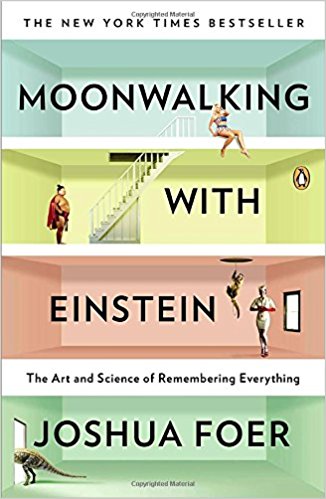Moonwalking with Einstein Summary
6 min read ⌚

MicroSummary: “Moonwalking with Einstein: The Art and Science of Remembering Everything” rummages through historical volumes and mental athletes’ manuals, whilst documenting Joshua Foer’s journey to become the 2006 U.S.A. Memory Champion and sharing the author’s favorite memory tips and tricks.
The Art and Science of Remembering Everything
Having trouble remembering faces and places? What about names and numbers? Or, for that matter, anything?
Joshua Foer doesn’t have any of these problems. At least not anymore.
In “Moonwalking with Einstein,” he writes how this transformation occurred.
Who Should Read “Moonwalking with Einstein”? And Why?
Memory is an integral part of everybody’s life. Whether it’s necessary to help you remember your cousins’ names at a cocktail party, or to pass your final exam with flying colors, it’s certainly one of your most valuable assets on a daily basis. And “Moonwalking with Einstein” tries to teach you techniques to remember better. So, really – this book is about everyone.
About Joshua Foer
 Joshua Foer is an American freelance journalist and published author. A Yale graduate, he went on to become the 2006 US Memory Champion.
Joshua Foer is an American freelance journalist and published author. A Yale graduate, he went on to become the 2006 US Memory Champion.
In addition to “Moonwalking with Einstein,” he has authored “Atlas Obscura,” a book about the weirdest and most peculiar places in the world.
“Moonwalking with Einstein Summary”
Have you ever heard of the “Iliad” and the “Odyssey”?
If not, the only two things you need to know now is that they are about three millennia old and that, combined, they are about 30,000 lines long!
Now, here’s another question:
The printing press was invented in 1440; how do you think these two epics reached us?
Here’s something that may shock you:
Many people in the ancient world knew them by heart! Each and every line of them! And the epics were orally transmitted from a generation to generation until they were written down.
We know – it sounds hard to believe. And we won’t blame you if you don’t believe us! In fact, nobody though something even remotely similar at least until eight decades ago. Because then, two Harvardians named Milman Parry and Albert Lord discovered this guy in Yugoslavia!
Over many days and many, many cups of coffee, he, Avdo Medjedovic, recited them several epics the length of the “Iliad” and the “Odyssey.” Even though he was an illiterate butcher!
If you want to, you can even hear him “guslaring” here!
How did he manage to have such an outstanding memory, as opposed to you who can’t remember the name of your second cousin?
Simply put – since he didn’t know how to read – he had to! So, he used some great techniques to help him! But, he didn’t actually develop them. In fact, Joshua Foer reminds us that until the invention of the printing press – almost everybody knew these techniques!
It was part of everybody’s formal or informal education! Ancient rhetoricians weren’t even allowed to read their speeches! A certain Cineas learned the names of all 900 Senate members in Rome – and more – in a day. Alexander the Great and King Cyrus reportedly knew the names of all their soldiers at all times!
What happened?
Everything: the printing press, modern educational system, the Internet. Simply put – we stopped remembering accurately!
Because rote memorization doesn’t work at all! True, phonological loops help a bit because of the power of repetition, but in the case of abstract facts, the effect wears off.
William James, a famous psychologist, learned this the hard way. He memorized the first 158 lines of Victor Hugo’s poem “The Satyr” at a rate of a line per 50 seconds. But, when he moved to John Milton’s “Paradise Lost,” instead of better, he got worse: this time around, he needed 57 seconds per line!
Joshua Foer thinks he knows what James did wrong: he hadn’t learned how to remember before he started remembering!
Learn to remember? Should we do that? And can we?
Of course we should and can! And Joshua Foer offers himself as the evidence! In another episode of the “Journalists Live Their Stories” book series (previously: we visited North Korea, worked without pants and picked up quite a few girls), “Moonwalking with Einstein” documents Foer’s yearlong ascent from a regular guy to a US Memory Champion, under the guidance of the best “mental athletes.”
Moreover, Foer is not stingy and shares the techniques.
We’ve already went through most of them with a Grand Master of Memory, so here’s just an overview of the most important ones.
Want to remember the number 2209198823 or the word HEADSHOULDERSKNEESTOES? Chunk them up into dates (22/09/1988 23) or punctuate them (HEAD, SHOULDERS, KNEES, TOES) and it will be a lot easier.
Adding music to the word sequence will make it almost unforgettable. Just like adding familiar emotions or strange images to a certain poem passage. An old experiment proves it: people are way better at remembering that a person works like a baker than remembering the surname Baker.
Even though it’s the same word!
Why?
Because they’ve contextualized the first one more appropriately in their brain. In other words, Baker is an abstract name; and the baker has a white uniform, a white hat and bakes bread.
Which one of these would you remember better?
Key Lessons from “Moonwalking with Einstein”
1. You Can Learn to Remember Better… And It Will Improve Your Grades
2. Use the Power of Your Preprogrammed Brain to Become a Memory Master
3. It’s Difficult to Forget Anything Related to Sex, Humor, And Emotions
You Can Learn to Remember Better… And It Will Improve Your Grades
The reason why you’re not remembering well is simple: you haven’t learned how to. Ancient civilizations knew many of the secrets and they employed them. The modern educational system is memory-based, and yet – nobody teaches you how to memorize things.
OK, there are some like South Bronx history teacher Raemon Matthews. Each year he selects the best ten of his students and enters them in the US Memory Championship. No matter what they do at the competition, this group, “The Talented Ten,” do better at school.
Both compared to themselves from before, and their peers.
Use the Power of Your Preprogrammed Brain to Become a Memory Master
There are some things that our ancestors had to remember. Like, for example, places or vivid things.
Why?
Because there were no maps for a long period of history and because poisonous things are usually colorful and vibrant.
That’s why, the method of loci or vivid imagination work in your favor still.
Use them and you’ll never forget.
It’s Difficult to Forget Anything Related to Sex, Humor, And Emotions
Speaking of the imagination and the hardwired brain!
Have you noticed how there are some things that always attract your attention? Like sex? Or a funny joke? Or powerful emotions?
As long as humans exist, these things will have the most powerful effect on you. That’s why it’s easier to remember the phone number of the girl with the bouncing breasts or the guy with a photoshopped six-pack than, say, the name of your second cousin. (God, what was it?)
So, the next you try to memorize something, transform it into something funny, sexy, or emotional. You’ll remember it for a long time.
Evolution guarantees that.
Like this summary? We’d Like to invite you to download our free 12 min app, for more amazing summaries and audiobooks.
“Moonwalking with Einstein” Quotes
The phrase ‘in the first place’ is a vestige from the art of memory. Share on X Monotony collapses time; novelty unfolds it. Share on X Each time we think about a memory, we integrate it more deeply into our web of other memories, and therefore make it more stable and less likely to be dislodged. Share on X Mental athletes said they were consciously converting the information they were being asked to memorize into images, and distributing those images along familiar spatial journeys. Share on X My experience had validated the old saw that practice makes perfect. But only if it’s the right kind of concentrated, self-conscious, deliberate practice. Share on XOur Critical Review
“Moonwalking with Einstein” is a fascinating volume, whether you are interested in participative journalism or how to improve your memory. Joshua Foer writes both with a critical rigor and an excellent sense of humor throughout, so there’s something about everyone in this book.
Remember to read it!
Emir is the Head of Marketing at 12min. In his spare time, he loves to meditate and play soccer.







